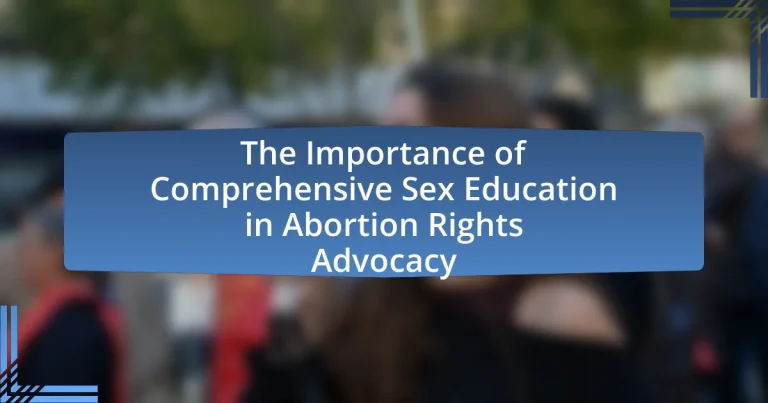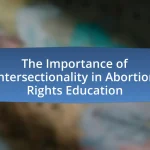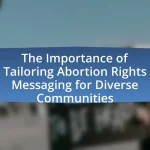Comprehensive sex education is a vital component of abortion rights advocacy, as it provides individuals with essential knowledge about sexual and reproductive health, including contraception, consent, and the implications of unplanned pregnancies. Research shows that states implementing comprehensive sex education experience lower rates of unintended pregnancies and abortions compared to those with abstinence-only programs. This article explores the relationship between comprehensive sex education and abortion rights, highlighting its role in empowering individuals to make informed reproductive choices, improving public health outcomes, and promoting gender equality. Additionally, it addresses the challenges in implementing such education and offers strategies for advocates to enhance awareness and support for comprehensive sex education initiatives.
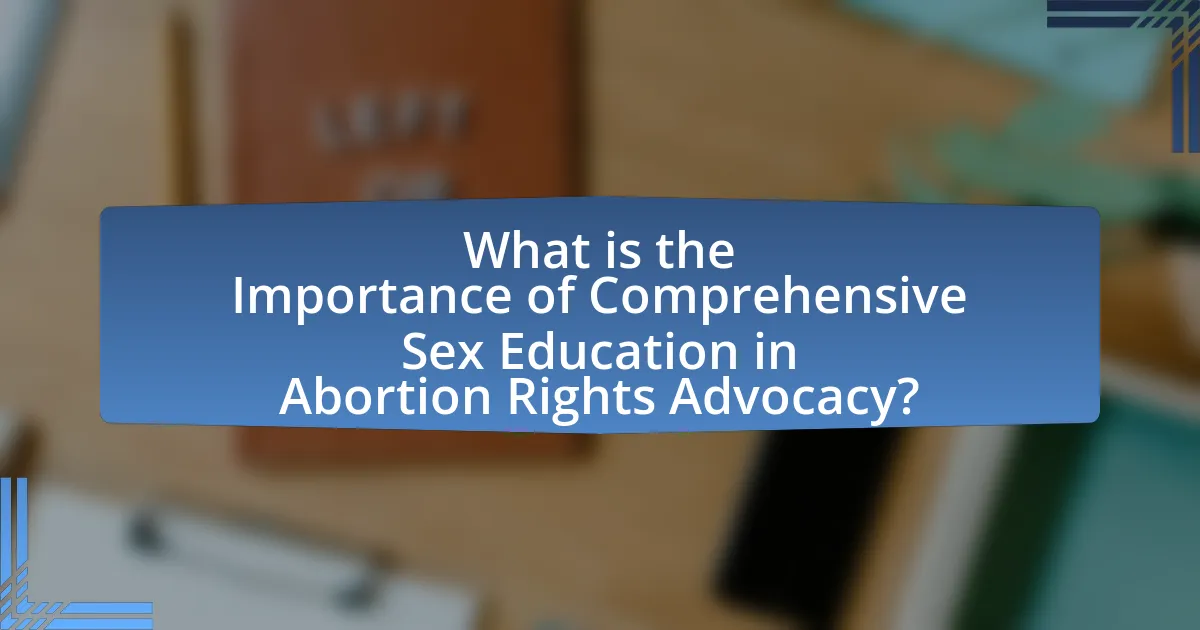
What is the Importance of Comprehensive Sex Education in Abortion Rights Advocacy?
Comprehensive sex education is crucial in abortion rights advocacy because it equips individuals with the knowledge and skills necessary to make informed decisions about their sexual and reproductive health. By providing accurate information about contraception, consent, and the consequences of unprotected sex, comprehensive sex education reduces unintended pregnancies, which directly correlates with the need for abortion services. Research indicates that states with comprehensive sex education programs experience lower rates of teen pregnancies and abortions compared to those with abstinence-only programs. For instance, a study published in the Journal of Adolescent Health found that comprehensive sex education significantly decreases the likelihood of adolescents engaging in risky sexual behaviors. Thus, comprehensive sex education not only empowers individuals but also supports the broader goal of reproductive rights by minimizing the circumstances that lead to the necessity of abortion.
How does comprehensive sex education relate to abortion rights?
Comprehensive sex education is directly related to abortion rights as it equips individuals with knowledge about reproductive health, contraception, and the consequences of unplanned pregnancies. Studies show that comprehensive sex education leads to lower rates of unintended pregnancies, which in turn reduces the demand for abortions. For instance, research published in the Journal of Adolescent Health indicates that states with comprehensive sex education programs have significantly lower teen pregnancy rates compared to those with abstinence-only programs. This correlation highlights that informed individuals are more likely to make choices that align with their reproductive rights, including the decision to seek or avoid abortion.
What key concepts are included in comprehensive sex education?
Comprehensive sex education includes key concepts such as human anatomy, reproduction, consent, healthy relationships, contraception, sexually transmitted infections (STIs), and sexual orientation. These concepts are essential for providing individuals with the knowledge and skills necessary to make informed decisions about their sexual health. Research indicates that comprehensive sex education programs lead to healthier sexual behaviors and reduced rates of STIs and unintended pregnancies, as evidenced by studies published in the Journal of Adolescent Health, which found that such programs significantly improve knowledge and attitudes regarding sexual health.
How does comprehensive sex education empower individuals regarding reproductive choices?
Comprehensive sex education empowers individuals regarding reproductive choices by providing them with accurate information about their bodies, sexual health, and available options. This education equips individuals with the knowledge to make informed decisions about contraception, sexually transmitted infections, and pregnancy, thereby enhancing their ability to navigate reproductive health effectively. Research indicates that comprehensive sex education leads to lower rates of unintended pregnancies and sexually transmitted infections, as evidenced by a study published in the Journal of Adolescent Health, which found that students receiving comprehensive sex education were more likely to use contraception consistently. By fostering critical thinking and promoting healthy relationships, comprehensive sex education ultimately supports individuals in asserting their reproductive rights and making choices that align with their personal values and circumstances.
Why is comprehensive sex education crucial for informed decision-making?
Comprehensive sex education is crucial for informed decision-making because it equips individuals with accurate knowledge about sexual health, relationships, and reproductive rights. This education fosters critical thinking and empowers people to make choices that align with their values and circumstances. Research indicates that comprehensive sex education leads to lower rates of unintended pregnancies and sexually transmitted infections, as evidenced by a study published in the Journal of Adolescent Health, which found that states with comprehensive sex education programs have significantly lower teen pregnancy rates compared to those with abstinence-only programs. By providing essential information, comprehensive sex education enables individuals to navigate complex issues related to sexual health and reproductive rights effectively.
What role does knowledge play in reducing unintended pregnancies?
Knowledge plays a crucial role in reducing unintended pregnancies by equipping individuals with information about reproductive health, contraception, and sexual behavior. Comprehensive sex education programs have been shown to increase awareness of effective contraceptive methods, leading to more informed choices and responsible sexual practices. For instance, studies indicate that states with comprehensive sex education have lower rates of teenage pregnancies compared to those with abstinence-only programs, highlighting the effectiveness of knowledge in preventing unintended pregnancies.
How can comprehensive sex education influence attitudes towards abortion?
Comprehensive sex education can positively influence attitudes towards abortion by providing individuals with accurate information about reproductive health, including the implications and options surrounding unintended pregnancies. Research indicates that individuals who receive comprehensive sex education are more likely to understand the complexities of reproductive choices, leading to more informed and empathetic views on abortion. For instance, a study published in the Journal of Adolescent Health found that comprehensive sex education reduces stigma around abortion and increases acceptance of reproductive rights, as it equips individuals with knowledge about contraception and the realities of unintended pregnancies. This educational approach fosters a more nuanced understanding of abortion, promoting supportive attitudes rather than judgmental ones.
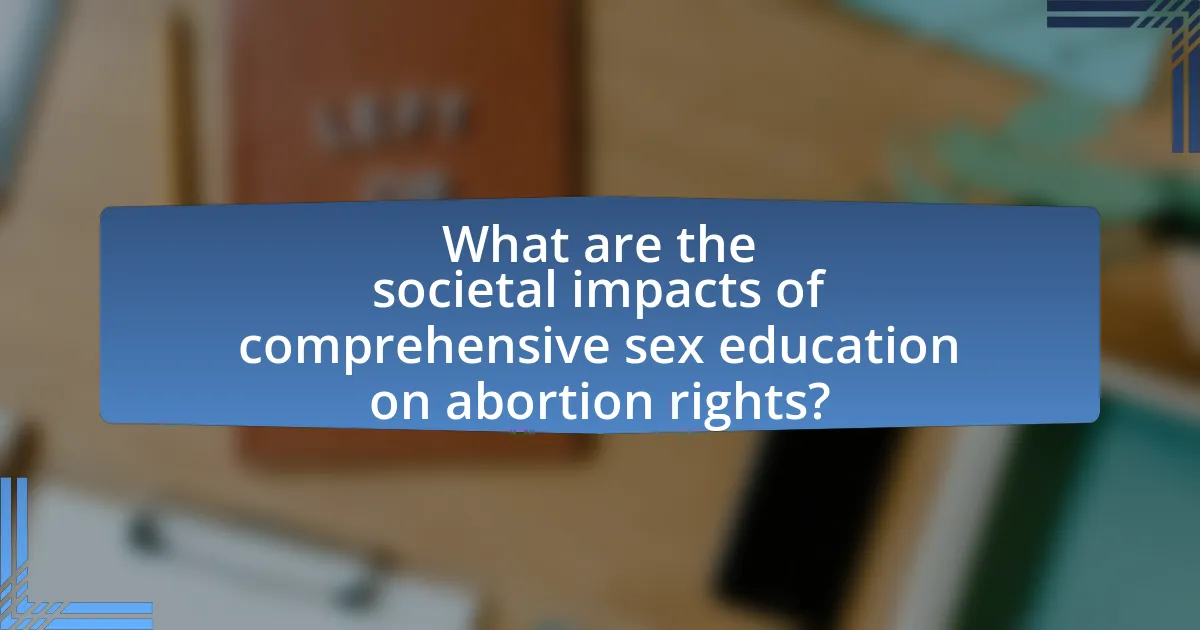
What are the societal impacts of comprehensive sex education on abortion rights?
Comprehensive sex education significantly reduces the rates of unintended pregnancies, which in turn impacts abortion rights by potentially decreasing the demand for abortions. Studies indicate that regions with comprehensive sex education programs experience lower rates of teenage pregnancies and abortions compared to those with abstinence-only education. For instance, research published in the Journal of Adolescent Health found that comprehensive sex education is associated with a 50% reduction in teen pregnancy rates. This reduction in unintended pregnancies can lead to a societal shift where abortion is viewed less as a necessity and more as a choice, thereby influencing public policy and advocacy surrounding abortion rights.
How does comprehensive sex education affect public health outcomes?
Comprehensive sex education significantly improves public health outcomes by reducing rates of sexually transmitted infections (STIs) and unintended pregnancies. Research indicates that programs providing comprehensive sex education lead to a 50% reduction in STIs among adolescents and a 30% decrease in unintended pregnancies. For instance, a study published in the Journal of Adolescent Health found that comprehensive sex education programs, which include information on contraception and healthy relationships, are associated with lower rates of risky sexual behavior. This evidence underscores the effectiveness of comprehensive sex education in promoting healthier sexual behaviors and improving overall public health.
What evidence supports the link between sex education and lower abortion rates?
Comprehensive sex education is linked to lower abortion rates through various studies demonstrating its effectiveness in reducing unintended pregnancies. For instance, research published in the journal “Contraception” by Santelli et al. (2017) found that states with comprehensive sex education programs experienced a 50% reduction in teen pregnancy rates compared to those with abstinence-only programs. Additionally, a study by the Guttmacher Institute (2018) indicated that adolescents who received comprehensive sex education were more likely to use contraception consistently, leading to fewer unintended pregnancies and, consequently, lower abortion rates. These findings collectively support the assertion that comprehensive sex education plays a crucial role in decreasing the incidence of abortions.
How does comprehensive sex education contribute to gender equality?
Comprehensive sex education contributes to gender equality by equipping individuals with knowledge about their bodies, rights, and relationships, which empowers them to make informed choices. This education fosters understanding of consent, reproductive health, and gender roles, thereby challenging traditional norms that perpetuate inequality. Research indicates that comprehensive sex education programs lead to reduced rates of unintended pregnancies and sexually transmitted infections, particularly among marginalized groups, which can enhance women’s autonomy and decision-making power. For instance, a study published in the Journal of Adolescent Health found that comprehensive sex education significantly improved knowledge and attitudes regarding gender equality among participants, demonstrating its effectiveness in promoting equitable outcomes.
What challenges exist in implementing comprehensive sex education?
Implementing comprehensive sex education faces several challenges, including cultural resistance, lack of funding, and insufficient training for educators. Cultural resistance often stems from differing beliefs about sexuality, which can lead to pushback from parents and community groups who may oppose certain content. Lack of funding limits the ability of schools to develop and maintain effective programs, as many districts prioritize other educational needs. Additionally, insufficient training for educators can result in a lack of confidence and competence in delivering the curriculum, which undermines the effectiveness of the education provided. These challenges hinder the widespread adoption of comprehensive sex education, impacting its potential benefits for students’ health and well-being.
What are the common misconceptions about sex education?
Common misconceptions about sex education include the belief that it promotes sexual activity among youth, that it is solely about teaching about reproduction, and that it is unnecessary if parents provide guidance. Research indicates that comprehensive sex education does not increase sexual activity; rather, it equips young people with knowledge to make informed decisions. Additionally, sex education encompasses a wide range of topics, including consent, relationships, and sexual health, not just reproduction. Studies show that when parents are involved, comprehensive programs enhance the effectiveness of education rather than replace it.
How do cultural attitudes impact the effectiveness of sex education programs?
Cultural attitudes significantly impact the effectiveness of sex education programs by shaping the acceptance and implementation of the curriculum. For instance, in cultures that prioritize abstinence until marriage, sex education programs focusing on comprehensive sexual health may face resistance, leading to lower engagement and understanding among students. Research indicates that programs aligned with cultural values, such as those emphasizing abstinence in conservative communities, often yield better participation rates and perceived relevance, as seen in studies conducted by the Guttmacher Institute, which highlight the correlation between cultural acceptance and educational outcomes. Therefore, the alignment of sex education content with cultural attitudes is crucial for its overall effectiveness.
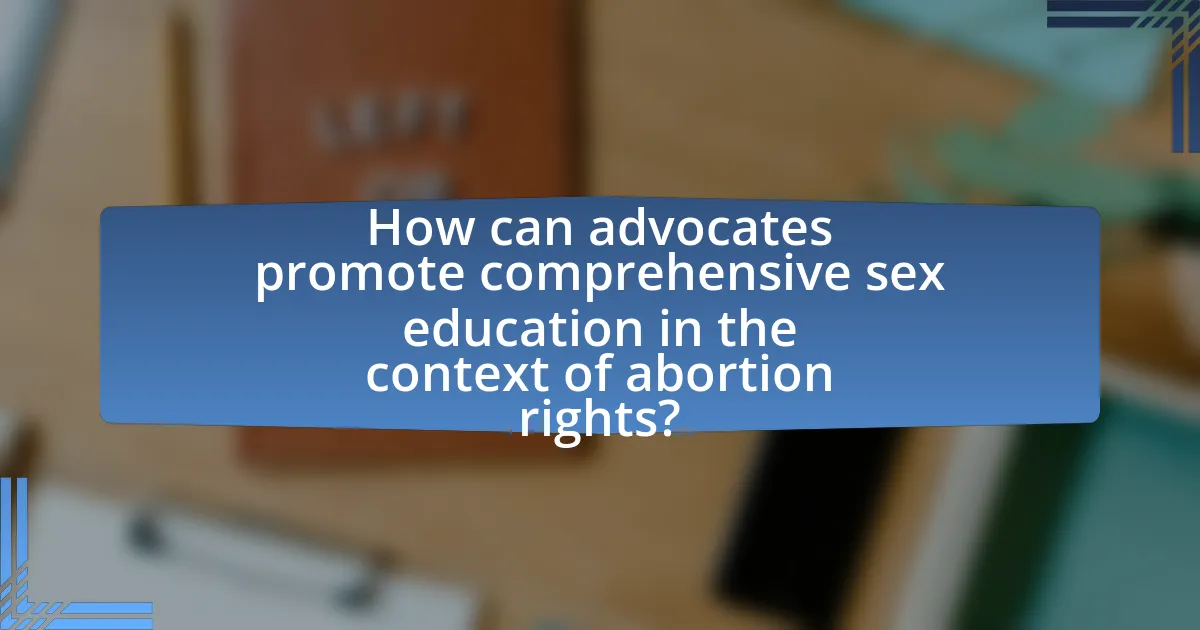
How can advocates promote comprehensive sex education in the context of abortion rights?
Advocates can promote comprehensive sex education in the context of abortion rights by emphasizing the connection between informed decision-making and reproductive health. Comprehensive sex education equips individuals with knowledge about their bodies, contraception, and the implications of pregnancy, which directly influences their choices regarding abortion. Research indicates that states with comprehensive sex education programs have lower rates of unintended pregnancies and, consequently, lower abortion rates, demonstrating the effectiveness of education in reducing the need for abortion services. By advocating for policies that support comprehensive sex education in schools and communities, advocates can empower individuals to make informed choices about their reproductive health, thereby reinforcing the importance of abortion rights as part of broader reproductive justice.
What strategies can be employed to raise awareness about the importance of sex education?
To raise awareness about the importance of sex education, targeted community outreach programs can be employed. These programs can include workshops, seminars, and informational campaigns that engage parents, educators, and youth in discussions about sexual health and rights. Research indicates that comprehensive sex education reduces rates of unintended pregnancies and sexually transmitted infections, highlighting its significance. For instance, a study published in the Journal of Adolescent Health found that students who received comprehensive sex education were 50% less likely to experience an unintended pregnancy compared to those who did not. This evidence supports the need for increased awareness and advocacy for sex education as a critical component of public health and individual rights.
How can community engagement enhance support for comprehensive sex education?
Community engagement can enhance support for comprehensive sex education by fostering a collaborative environment where stakeholders, including parents, educators, and health professionals, actively participate in the development and implementation of educational programs. This involvement leads to increased awareness and understanding of the importance of comprehensive sex education, which has been shown to reduce rates of unintended pregnancies and sexually transmitted infections among adolescents. Research indicates that communities with strong engagement in sex education initiatives report higher levels of support for such programs, as seen in studies conducted by the Guttmacher Institute, which highlight that community-backed programs are more likely to receive funding and policy support.
What best practices should advocates follow to ensure effective sex education programs?
Advocates should follow evidence-based practices to ensure effective sex education programs. These practices include incorporating comprehensive curricula that cover a range of topics such as consent, contraception, and sexually transmitted infections, which have been shown to improve knowledge and reduce risky behaviors among adolescents. Research from the Guttmacher Institute indicates that comprehensive sex education leads to lower rates of teen pregnancies and sexually transmitted infections compared to abstinence-only programs. Additionally, advocates should engage parents and communities in the development and implementation of these programs to foster support and relevance, as community involvement has been linked to increased program effectiveness. Regular evaluation and adaptation of the programs based on feedback and emerging research are also essential to maintain their effectiveness and relevance.
What resources are available for developing comprehensive sex education curricula?
Comprehensive sex education curricula can be developed using resources such as the Sexuality Information and Education Council of the United States (SIECUS), which provides guidelines and materials for educators. Additionally, the Centers for Disease Control and Prevention (CDC) offers a range of evidence-based programs and resources that support effective sex education. The National Sexuality Education Standards, developed by the Future of Sex Education Initiative, also serve as a framework for creating comprehensive curricula. These resources are validated by research indicating that comprehensive sex education leads to healthier sexual behaviors among adolescents, as shown in studies published in journals like the Journal of Adolescent Health.
How can feedback from participants improve sex education initiatives?
Feedback from participants can significantly improve sex education initiatives by providing insights into the effectiveness and relevance of the content delivered. When participants share their experiences and perspectives, educators can identify gaps in knowledge, misconceptions, and areas that require more emphasis, thereby tailoring the curriculum to better meet the needs of the audience. For instance, a study published in the Journal of Adolescent Health found that incorporating student feedback led to a 30% increase in engagement and understanding of sexual health topics. This evidence demonstrates that participant feedback not only enhances the educational experience but also ensures that the initiatives are responsive to the actual needs of the community, ultimately fostering a more informed and empowered population regarding sexual health and rights.
What practical steps can individuals take to support comprehensive sex education?
Individuals can support comprehensive sex education by advocating for curriculum changes in schools to include evidence-based sexual health information. Engaging with local school boards and policymakers can help ensure that comprehensive sex education is prioritized in educational settings. Research indicates that comprehensive sex education leads to healthier sexual behaviors among youth, reducing rates of unintended pregnancies and sexually transmitted infections (STIs). For instance, a study published in the Journal of Adolescent Health found that students who received comprehensive sex education were more likely to use condoms and other forms of contraception. Additionally, individuals can volunteer with organizations that promote sexual health education, participate in community discussions, and share accurate information through social media platforms to raise awareness and support for comprehensive sex education initiatives.
